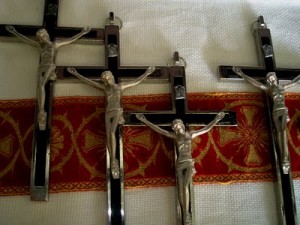Posted by jubileusze2014 in Kasata Zakonu, Źródła | 0 Comments
Kasata: 3

Cześć trzecia
Język angielski
Dok. 7
Rome, 15 December 1759. John Thorpe[1] to Jenison,, Archives of the British Province of the Society of Jesus, John Thorpe: Miscellaneous Letters, 1754-1792, fols. 21v-22r
Austin has since given you an account of the arrival of the 123 Portuguese at Civita Vecchia, one of whom is since dead. I sent a long relation which I had collected from the best authorities to Liège. 140 came to Genoa about a month ago, but not allowed to come on shore, nor at Leghorn where the ship now is unloading her merchandize. The poor passengers have suffered considerably and their sufferings daily increase, as the weather has been for a long time both cold and rainy, and the Captain will not allow any fire to be made on board under any pretext whatever. But Monsieur Botta has now sent express orders to the Captain of the vessel that if he can not immediately unload here, to procure another for the Portuguese Fathers to Civita Vecchia, but the wind has been contrary ever since. Those 120 that are already at the villa of the Roman College upon the Tusculum live very conveniently. Many persons of quality have gone to see them, all even their very enemies are charmed with their truly religious modesty and whole behaviour. Before they left Lisbon, every art was tried to make them abandon the Society. The same means are used to shake the constancy of those who have been since sent from thence. Some few have yielded to the importunities of acquaintances and relations, to long sufferings in prison, to promises of preferment. Many of the others have renewed their obligations to God by writing them in their own blood and sending them to those who were most earnest to pervert them. More are daily expected but how will the Jesuits find money to maintain them? Their economy has almost retrenched from necessaries in the Roman Province to assist their exiled Brethren. What other provinces will do is not yet known. The General has ordered for the whole Society an additional Mass once a week during the whole year [17]60 to be said every Saturday the Collect pro Familia seu Congregatione and a novena before the 25o Martio.
Dok. 8
Rome 13 December 1760. John Thorpe to Jenison , Archives of the British Province of the Society of Jesus, John Thorpe: Miscellaneous Letters, 1754-1792, fol. 23r
Rome was perhaps never so stacked with Jesuits as at present. There are near 600 of them within the walls from almost every nation under the sun and, though persecuted almost all the world over, their pulpits, schools etc. are as much frequented and with as much credit as ever. The new guests from the Brasils and Islands give great edification in all places. Their two numerous houses want for nothing. Their schollars have their weekly villa, and their business within doors goes on with the greatest regularity. Ten or twelve of the Brasilians have died since their arrival, one in great opinion of sanctity, the others with a calmness and serenity which is astonishing.
Dok. 9
Rome 13 November 1763, Father General Lorenzo Ricci to the Whole Society.
In: Sydney F. SMITH, S.J., The Suppression of the Society of Jesus, ed. Joseph A. Munitiz, S.J. [Leominster: Gracewing, 2004], p. 255.
Let us try to defend the honor of the Society by the purity of our lives, by the holiness of our speech, by our unwearied zeal for the salvation of souls, and not by the tainted soundings of our own praises, nor by the evil-speaking contempt of others.
Dok. 10
Rome 21October 1767. John Thorpe to Edward Walsh, Archives of the British Province of the Society of Jesus, John Thorpe, Miscellaneous Letters, 1754-1792, fols. 326r-v.
The Spanish Exiles suffer much in Corsica. None of the American provinces are yet arrived. Nor is it known here what has yet been done in those countries or even where the Spanish Procurators are who are detained in Spain. Other Jesuits are expected from the dungeons of Lisbon, and I hope young Atkins may be amongst them. We have begun to melt down a considerable quantity of Church Plate for the maintenance of the Portuguese, but all will not suffice. Some other means must be taken. We wait with anxiety to see what will be.
Dok. 11
Rome, 24 November 1767, John Thorpe to Jenison, Archives of the British Province of the Society of Jesus, John Thorpe: Miscellaneous Letters, 1754-1792, without foliation
The Jesuits in Portugal, France, Spain & Naples all alike long flattered themselves with notions of safety; they are now all alike thrown into common ruin and misery. The 20th of November was the fatal day at Naples. We do not yet know but suppose the expulsion to have been executed in Sicily and the territories of Parma at the same hour. Endeavours will undoubtedly be used to preserve at least the heart of the Society alive in the Pope’s dominions but in every other country it is thought to be agonizing.
Dok. 12
23 July 1768 Thorpe Newsletter, Archives of the British Province of the Society of Jesus, MZ 2.
Extraordinary devotion is now practising towards the Jesuits at Rome, and their exiled Sicilian and Napolitan brethren to implore the divine assistance through the intercession of St. Ignatius. It is a subject of great consolation to experience the spiritual good that is done by the Jesuits in the several country towns where they are in exile. The people of some of these towns and villages were vicious almost to a proverb, but are already much changed for the better since those religious exiles came amongst them. The poor people themselves are sensible of their advantage and express it with gratitude. Some days ago I met a troop of the inhabitants of a large village in the Campania and asking them how they and their new guests agreed. They answered me with a gladness that even without words would have abundantly appeared in their countenance, that since those saintly Fathers (for so they call the disgraced exiled Jesuits) were come amongst them, the whole country had made its peace with God and returned into his favour. This is a literal translation of the words they said to me, without knowing that I would be anyways interested in their answer.
In Rome some saucy insolent satyrs have lately appeared against the government, and one or two very severe ones against the Jesuits. The most outrageous is made from the words Ego vobis Romae propitius ero, and St Ignatius thoughts upon them as they are recorded in the histories of his life. It concludes that the present children of the Saint can expect and deserve no other cross than that of the impenitent thief.
There are very many who by no means would be thought enemies to the Society, but who vigorously maintain that it might and ought now to be sacrificed for the good of the whole Church. It would not indeed be dishonourable for the Jesuits to be buried in a grave from whence a sure and solid peace of the Church should rise and flourish; but this cannot be hoped for, and those who pretend to expect it, rather will not, than cannot see, that the destruction of the Society is only aimed at for the same motive that Generals in a siege endeavour to become master of the outworks.
Dok. 13
John Thorpe to Jenison, 16 January 1773, Archives of the British Province of the Society of Jesus, John Thorpe, Miscellaneous Letters, 1754-1792, fols. 145r-v
We are yet alive & they tell us that next week we are to know the final system of destruction as it has been improved & enlarged by the Court of Madrid. In the mean time the town varies in its conjectures, some of which are very favourable upon the credit of a supposed more humane change of humour in the Spanish Monarch than had been before discovered. Others have no confidence in this, nor in any pretended letter from the Emperor to the Pope in favour of the Society. At Rome things are carried on as usual & the Jesuits more than ever perplexed. The Roman College has presented a memorable to the Pope for licence to alienate some valuable moveable objects belonging to their House & Church, & they have received a Rescript by way of answer Non Expedire, which has greatly embarrassed them. There is a very numerous Community & above one half of the Revenues has been seized by Naples, notwithstanding which loss, they have yearly contributed largely to the maintenance of the Portuguese Exiles. The General discouraged by this unaccountable denial to the College, is afraid of making a like Petition, tho’ he be in greater necessity as the whole load of the Portuguese lays immediately upon him, & he has also the wants of several others to provide for.
Dok. 14
7 August 1773, Thorpe Newsletter, Archives of the British Province of the Society of Jesus, MS A.III.15.
The feast of St. Ignatius was forbid to be celebrated at any of the places where the popes Brief for visiting, Seizing etc. has been notified. The distressed circumstances of the Roman College did not permit it to be kept in that noble Church, tho’ dedicated to the Saint. There was neither Holy Mass nor Vespers. The Devotion of the Religious and other pious Persons supplied the Defect by long and fervent prayers, which made an appearance of People retired into the Catacombs silently to implore aid in some public calamity. The same was observed during the whole Month before and after the Octave of the Feast, and it is hoped will continue with equal fervour, and prevail with Heaven in favour of the distressed Society. Petitions have come from all parts lately to the General for anticipating professions that it has been thought proper to grant an anticipation of 12 months to anyone who has the due requisites, and desires it.
[1] Born in Halifax, Yorkshire, in 1726, John Thorpe studied at the English Jesuit college in St Omers (France) between 1741 and 1747. He’s entered the English Province novitiate at Watten in 1747-1749, studied philosophy at the English College, Liège (1750-1751), and did his regency at St Omers (1752-1755). He arrived in Rome to study theology in November, 1756 and remained there after ordination initially on the staff of the English College and later as English language confessor at the College of the Penitentiaries at St. Peter’s. He died in Rome on 12 April 1792. He was a copious correspondent and kept his English colleagues informed of what was happening at Rome.


